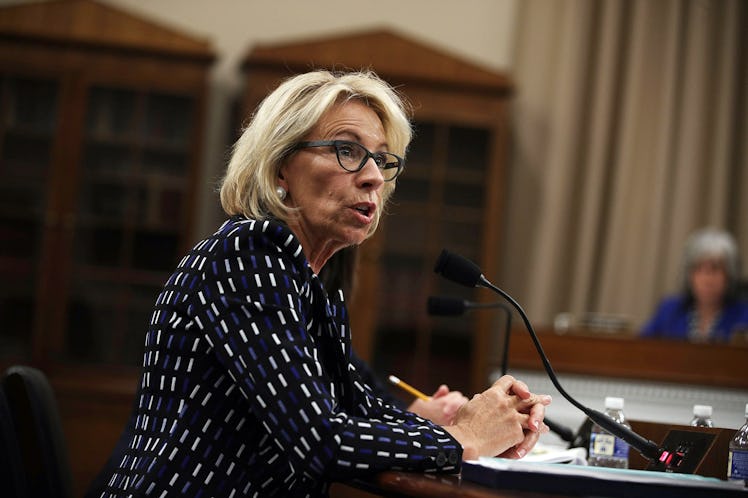
The Trump Admin Is Asking Colleges To Not Consider Race A Factor In Admissions
On Tuesday, July 3, President Donald Trump's administration moved to rescind affirmative action guidance that was set by the administration of his predecessor, President Barack Obama. According to multiple reports, the Department of Education targeted Tuesday afternoon for the release of an official statement in which it would issue new guidance to schools and colleges. That guidance would encourage "race-neutral" admissions, The New York Times reports.
In a statement to CNN, a Justice Department spokesperson said,
The executive branch cannot circumvent Congress or the courts by creating guidance that goes beyond the law and — in some instances — stays on the books for decades. Last year, the Attorney General initiated a review of guidance documents, which resulted in dozens of examples — including today's second tranche of rescissions — of documents that go beyond or are inconsistent with the Constitution and federal law. The Justice Department remains committed to enforcing the law and protecting all Americans from all forms of illegal race-based discrimination.
The spokesperson's mention of "protecting" Americans from "race-based discrimination" indicates that the Trump administration views an effort to discourage affirmative action as an effort to combat discrimination itself.
Meanwhile, the Obama administration outlined on multiple occasions that it believed affirmative action policies promote better and more useful learning environments.
In a letter of guidance issued jointly by the Department of Education and the Department of Justice in 2011, the Obama administration stated, "For all these reasons, the Departments recognize the compelling interest that postsecondary institutions have in obtaining the benefits that flow from achieving a diverse student body."
The 2011 letter also encouraged considering race in admissions without making race the "definitive" characteristic.
"If race-neutral approaches would be unworkable to achieve your compelling interest, you may then consider approaches that take into account the race of individual students," the letter reads. "When taking into account an individual student’s race among other factors to achieve diversity, evaluate each student as an individual and do not make the student’s race his or her defining characteristic."
The Trump administration's plans to issue new guidance on admissions policies further illustrates the nature in which department policies can change from one policy, to another during the next administration, and then back again after the following administration.
According to The New York Times, the Trump administration plans to restore guidance set forth by the Department of Education under President George W. Bush in 2008. On that occasion, the guidance stated, "The Department of Education strongly encourages the use of race-neutral methods for assigning students to elementary and secondary schools."
The Trump administration's move in this area is also worth watching at a time when the president is interviewing candidates to replace soon-to-be-retired Supreme Court Justice Anthony Kennedy. In 2016, Justice Kennedy wrote the opinion for a 5-4 split decision that upheld affirmative action policies at the University of Texas.
In the decision, Kennedy wrote that the university's practices should consistently be tweaked and scrutinizes, but ultimately ruled that the practices were not unlawful.
"The University of Texas at Austin has a special opportunity to learn and to teach. The University now has at its disposal valuable data about the manner in which different approaches to admissions may foster diversity or instead dilute it," he wrote.
However, now that Kennedy is on his way out, affirmative action is seen as an area that could be most affected by the next Supreme Court appointment. That's because of two key points. First, Justice Kennedy was seen as a swing vote, and the Trump administration is expected to nominate a more conservative judge.
Second, another major affirmative action case is expected to make its way to the Supreme Court in the future, which means a new look court may rule against the practice.
In other words, the Trump administration, with its latest move at the education department, is articulating its position on a major issue as it searches for a new justice that might rule on that same issue in the near future.